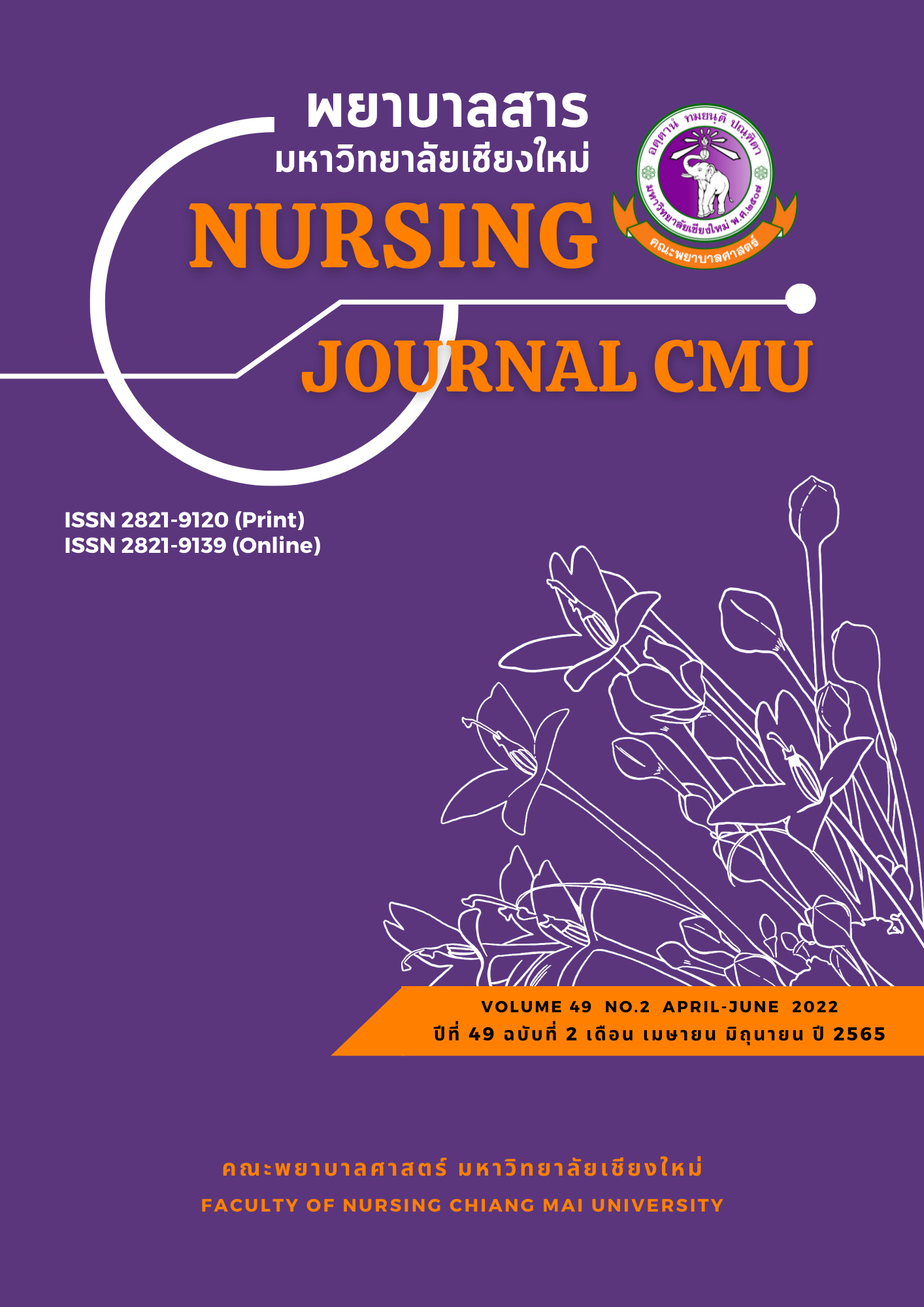การสนับสนุนทางสังคมสมรรถนะแห่งตนและการปฏิบัติการดูแลในผู้ปกครองของเด็กที่เป็นโรคหัวใจพิการแต่กำเนิด สาธารณรัฐสังคมนิยมประชาธิปไตยศรีลังกา
คำสำคัญ:
การปฏิบัติการดูแล, เด็ก, โรคหัวใจพิการแต่กำเนิด, สมรรถนะแห่งตนในผู้ปกครอง, การสนับสนุนทางสังคมบทคัดย่อ
การปฏิบัติการดูแลของผู้ปกครองเด็กที่เป็นโรคหัวใจพิการแต่กำเนิดที่เหมาะสมเป็นสิ่งสำคัญเพราะช่วยลดการเกิดภาวะแทรกซ้อนจากโรคในเด็ก และช่วยให้เด็กได้รับการผ่าตัดตามแผนการรักษา การวิจัยเชิงพรรณนาหาความสัมพันธ์ครั้งนี้ มีวัตถุประสงค์เพื่อศึกษาการปฏิบัติการดูแลของผู้ปกครองเด็กที่เป็นโรคหัวใจพิการแต่กำเนิด และศึกษาความสัมพันธ์ระหว่างการสนับสนุนทางสังคม สมรรถนะแห่งตนของผู้ปกครองในการปฏิบัติการดูแลของผู้ปกครองสำหรับเด็กที่เป็นโรคหัวใจพิการแต่กำเนิด กลุ่มตัวอย่างเป็นผู้ปกครองเด็กโรคหัวใจพิการแต่กำเนิดชนิดไม่เขียว อายุ 1 ถึง 5 ปี จำนวน 88 ราย เลือกตามเกณฑ์การคัดเลือกกลุ่มตัวอย่าง รวบรวมข้อมูล ณ คลินิกโรคหัวใจ และคลินิกโรคหัวใจและทรวงอก โรงพยาบาลระดับตติยภูมิ ประเทศสาธารณรัฐสังคมนิยมประชาธิปไตยศรีลังกา ระหว่างเดือนมีนาคม ถึง เดือนเมษายน 2562 เครื่องมือที่ใช้ในการวิจัยประกอบด้วย แบบสอบถามเรื่องการปฏิบัติการดูแลของผู้ปกครอง การสนับสนุนทางสังคม และสมรรถนะแห่งตนของผู้ปกครอง ซึ่งเครื่องมือวิจัยผ่านการทดสอบหาความเที่ยงตรงของเนื้อหาและความเชื่อมั่น ได้ค่าความเที่ยงตรงของแบบสอบถามเท่ากับ 0.96, 0.98, and 0.97 ตามลำดับ ได้ค่าความเชื่อมั่นของแบบสอบถามเรื่องการปฏิบัติการดูแลของผู้ปกครองด้วยวิธีการทดสอบซ้ำได้เท่ากับ 0.74 ความเชื่อมั่นของแบบสอบถามการสนับสนุนทางสังคม และสมรรถนะ
แห่งตนของผู้ปกครอง ได้ค่าสัมประสิทธิ์อัลฟาของครอนบาคเท่ากันคือ 0.80 วิเคราะห์ข้อมูลโดยใช้สถิติเชิงพรรณนาและสถิติ Pearson’s correlation coefficient
ผลการวิจัยพบว่า
- 1. กลุ่มตัวอย่างร้อยละ 94.40 มีค่าคะแนนเฉลี่ยรวมของการปฏิบัติการดูแลของผู้ปกครองอยู่ในระดับสูง (= 112.18, SD = 8.19) พิจารณารายด้านทั้ง 10 ด้านของการปฏิบัติการดูแลพบว่า 9 ด้าน มีค่าคะแนนเฉลี่ยรวมอยู่ในระดับสูง ยกเว้นด้านการดูแลสุขภาพฟันมีค่าคะแนนเฉลี่ยรวมอยู่ในระดับปานกลาง
- 2. การสนับสนุนทางสังคมมีความสัมพันธ์เชิงบวกกับการปฏิบัติการดูแลของผู้ปกครองระดับปานกลาง (r = .47, p < 0.05) และสมรรถนะแห่งตนของผู้ปกครองมีความสัมพันธ์เชิงบวกกับการปฏิบัติการดูแลของผู้ปกครองระดับสูง (r = .56, p < 0.05)
ผลการศึกษาครั้งนี้เป็นข้อมูลพื้นฐานสำหรับพยาบาลและบุคลากรสุขภาพที่เกี่ยวข้องกับหน่วยโรคหัวใจเด็กเพื่อความเข้าใจและส่งเสริมการปฏิบัติการดูแล การสนับสนุนทางสังคม และสมรรถนะแห่งตนของผู้ปกครองของเด็กโรคหัวใจพิการแต่กำเนิด
เอกสารอ้างอิง
Abdel-Salam, A., Mahmoud, F., & Author, C. (2018). Effect of educational program on the self-efficacy and quality of life for mothers caring children with congenital heart disease. IOSR Journal of Nursing and Health Science 7 (4), 68–78.
Bandura, A. (1997). Self-efficacy: Exercise of control. New York: Cambridge University.
Barigozzi, F., Cremer, H., & Roeder, K. (2018). Women’s career choices, social norms and childcare policies. Journal of Public Economics, 168, 162-173.
Chaisom, P., Yenbut, J., Chontawan, R., Soivong, P., & Patumanond, J. (2010). Predicting factors of dependent care behaviors among mothers of toddlers with congenital heart disease. Chiang Mai University Journal of Natural Sciences, 9(2), 193-200.
Ernawati, Y., Sudargo, T., & Lusmilasari, L. (2016). Self-efficacy related to parental feeding behaviour in toddler besides social support and dependent-care agency. International Journal of Community Medicine and Public Health, 3(5), 1247–1254.
Gamage, M. P., Sithamparapillai, K., Perera, S. N., Ranawaka, R., & Jayatissa, R. (2019). Prevalence of malnutrition in children with congenital heart disease awaiting cardiac intervention at a tertiary care setting Sri Lanka. Sri Lankan Journal of Cardiology, 1(2), 39-43.
Ghajari, M., Mojtahedzadeh, S., Kharazifard, M. J., Mahdavi, B., Mohtavipour, S., & Dentistry, P. (2014). Evaluation of knowledge, attitude and practice of parents of children with cardiac disease about oral health. Journal of Islamic Dental Association of Iran, 25(4), 256-260.
House, J. S. (1981). Work, stress, and social support. Reading, MA: Addison-Wesley Series.
Iruthayanathan, R. R., Jones, A., Adwani, S., & Gnanapragasam, J. P. (2018). 34 The profile of congenital cardiac services in Northern Sri Lanka: A single centre study. Heart, 104 (A12). Retrieved from http://dx.doi.org/10.1136/heartjnl-2017-BCCA.34
Kyle, T., & Carman, S. (2017). Essentials of pediatric nursing (3rd ed.). Philadelphia: Wolters Kluwer Health/Lippincott.
Mathew, S., Zhai, F., & Gao, Q. (2017). Social support and parental nurturance among Asian Indian families in the US: Mediating role of parenting self-efficacy. Journal of Family and Economic Issues, 38(3), 354-369.
Murdock, K. W. (2013). An examination of parental self-efficacy among mothers and fathers. Psychology of Men & Masculinity, 14(3), 314-323.
Phromreungrit, K., Jintrawet, U., & Chotibang, J. (2015). Caregiving and related factors among caregivers of children with congenital heart disease. Nursing Journal, 42 (supplement), 35-45. (In Thai).
Polit, D. F., & Beck, C. T. (2008). Nursing research: Generating and assessing evidence for nursing practice (8th ed.). Philadelphia: Lippincott.
Rohit, M., & Shrivastava, S. (2018). Acyanotic and Cyanotic Congenital Heart Diseases. The Indian Journal of Pediatrics, 85(6), 454-460.
Samarasingha, D. (2018). A project by the community to save the children of Sri Lanka. Sri Lanka Journal of Cardiology, 1(1), 112-116.
Soiphet, S., Jintrawet, U., & Mesukko, J. (2019). Parental care behaviors and related factors of preventing respiratory tract infections in children with congenital heart disease. Nursing Journal 46(1), 99 -108. (in Thai).
Srikotr, A., Jintrawet, U., & Mesukko, J. (2018). Factors predicting care behavior of caregivers to preventing respiratory tract infections in children with congenital heart disease. Nursing Journal 45(4) 15-25. (In Thai).
Suklerttrakul, T., Picheansathian, W., Jintrawet, U., & Chotibang, J. (2018). Support program for Thai mothers of toddlers with congenital heart disease: A randomized control trial. Pacific Rim International Journal of Nursing Research, 22(2), 106-120.
Thawitha, L. (2014). Preterm infant’s development promoting behaviors among primary care givers and related factors (Unpublished master’s thesis). Chiang Mai University, Thailand.
Van der Linde, D., Konings, E. E. M., Slager, M. A., Witsenburg, M., Helbing, W. A., Takkenberg, J. J. M., & Roos-Hesselink, J. W. (2011). Birth prevalence of congenital heart disease worldwide: A systematic review and meta-analysis. Journal of the American College of Cardiology, 58(21), 2241-2247.
Vijayalakshmi, I. B. (2015). Evaluation of left to right shunts by the pediatrician: How to follow, when to refer for intervention? The Indian Journal of Pediatrics, 82(11),1027–1032.
ดาวน์โหลด
เผยแพร่แล้ว
รูปแบบการอ้างอิง
ฉบับ
ประเภทบทความ
สัญญาอนุญาต
ลิขสิทธิ์ (c) 2022 พยาบาลสาร

อนุญาตภายใต้เงื่อนไข Creative Commons Attribution-NonCommercial-NoDerivatives 4.0 International License.
บทความที่ได้รับการตีพิมพ์เป็นลิขสิทธิ์ของวารสารพยาบาลสาร
ข้อความที่ปรากฏในบทความแต่ละเรื่องในวารสารวิชาการเล่มนี้เป็นความคิดเห็นส่วนตัวของผู้เขียนแต่ละท่านไม่เกี่ยวข้องกับมหาวิทยาลัยเชียงใหม่ และคณาจารย์ท่านอื่นๆในมหาวิทยาลัยฯ แต่อย่างใด ความรับผิดชอบองค์ประกอบทั้งหมดของบทความแต่ละเรื่องเป็นของผู้เขียนแต่ละท่าน หากมีความผิดพลาดใด ๆ ผู้เขียนแต่ละท่านจะรับผิดชอบบทความของตนเองแต่ผู้เดียว






